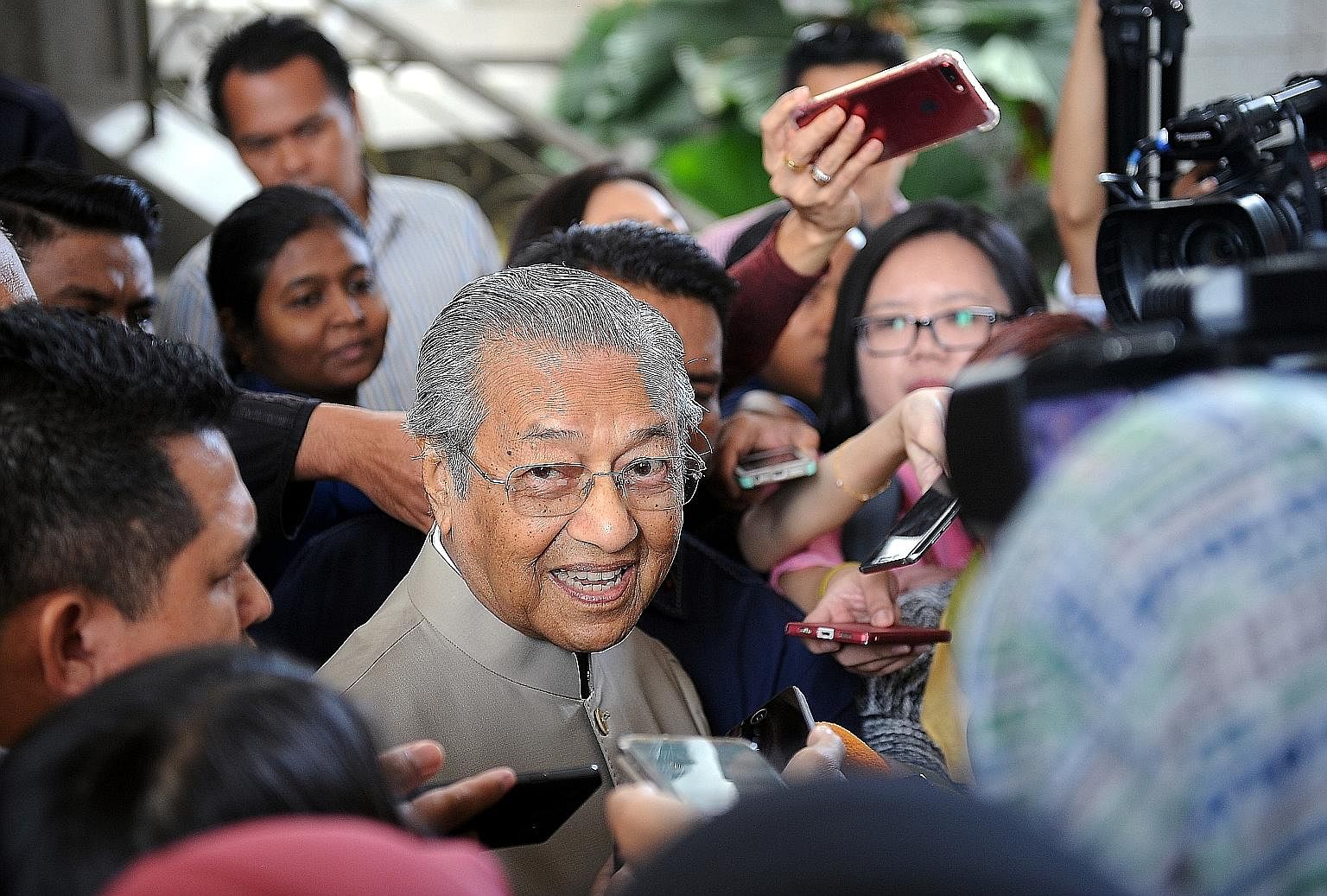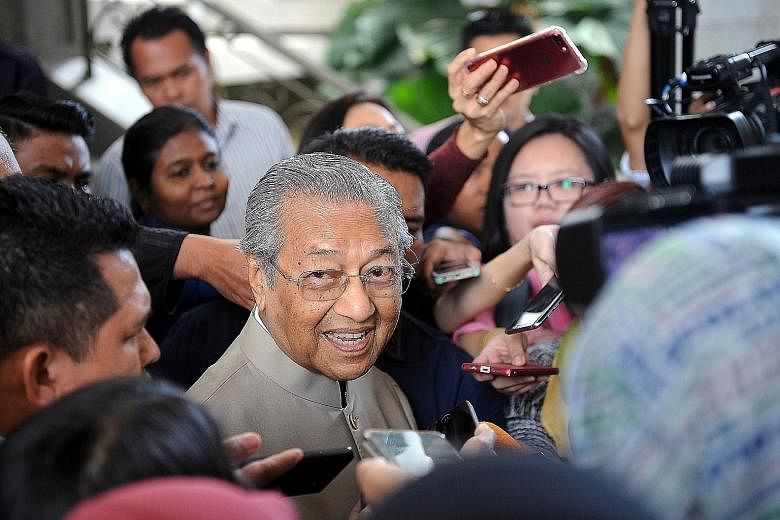Malaysia's longest-serving prime minister had faced down party revolts and street protests, and fought pitched battles to keep the economy humming during the Asian financial crisis.
Today, Tun Dr Mahathir Mohamad, in his new role as opposition chief, is facing again some of the financial and political scandals that he had papered over several decades ago.
With the Malaysian general election expected to be called within months, the administration of Prime Minister Najib Razak has dug up scandals that occurred during Dr Mahathir's 22-year reign between 1981 and 2003.
The government's Royal Commission of Inquiry (RCI) last month started its probe into the billions of dollars lost by Bank Negara Malaysia in foreign exchange speculation in the early 1990s. And talk is heating up of the formation of another royal commission of inquiry over the 1985 clash in Kedah's Memali village that led to the deaths of four policemen and 14 villagers.
There is also a buzz in Malaysia that more Mahathir-era scandals could be trotted out.
Rattling these skeletons is more than just an idle hobby for Datuk Seri Najib. It has manifold uses - to drive a wedge between Dr Mahathir and his new-found friends in the opposition; to jolt the memory of the electorate who remember only Dr Mahathir's plus points; and critically, to deflect attention from Mr Najib's own troubles.
Dr Mahathir, 92, has been at the forefront in criticising Mr Najib for the billions allegedly misappropriated from state fund 1Malaysia Development Berhad.
Mr Najib is also facing the ire of Malay farmers, who form a big chunk of government supporters, after corruption and financial mismanagement were unearthed in the national land development agency, Felda.

"He is trying to check Mahathir. It's about digging up the past and incriminating Mahathir," said analyst Amir Fareed Rahim at KRA political risk consultancy. "They (the government) are doing it because they acknowledge that Mahathir is a threat to the Malay ground."
The government hopes that these old issues would sway voters, especially fence-sitters, at the next general election, which must be held within a year.
The forex RCI was also intended to demonstrate how opportunistic, and hypocritical, the opposition can be. The inquiry was told that former finance minister Anwar Ibrahim, now in opposition and an ally of Dr Mahathir, knew about the huge sums lost then but kept mum.
Opposition veteran Lim Kit Siang, another new buddy of Dr Mahathir, had for decades called for an inquiry into the forex losses, but has today become critical of the commission's tasks.
The Memali issue, meanwhile, could gain brownie points for Mr Najib from supporters of Umno-friendly opposition party, Parti Islam SeMalaysia (PAS). Most of the villagers killed in that government-ordered raid on religious deviants were PAS members.
Indeed, there are plenty more skeletons waiting to be dug up.
The list of Mahathir era scandals is a long one as they happened during the go-go years of fast growth under a strong-willed leader pushing to modernise Malaysia using patronage politics.
These included financial scandals such as those involving Bumiputera Malaysia Finance (BMF), Perwaja Steel and Port Klang Free Zone (PKFZ).
In the 1979 to 1983 BMF issue, hundreds of millions of dollars in bad loans were lent out by the government bank to Hong Kong property players.
In the Perwaja scandal, from 1992 to 1995, a government plan to bolster the local steel industry failed, with accusations that millions of dollars earmarked for development went missing. Meanwhile, in the RM12 billion PKFZ scandal in the 1990s, alleged corruption greatly inflated the costs of building the regional shipping hub.
Political scandals included Project IC in Sabah where tens of thousands of identity cards were allegedly given out to Filipino Muslims in the early 1990s to change voting patterns, and the sacking and prosecution of then deputy premier Anwar Ibrahim in 1998 on what many saw as politically-motivated criminal charges.
According to the late Barry Wain, a former editor of the Asian Wall Street Journal who wrote a book about the former premier, Dr Mahathir squandered RM100 billion - or US$40 billion at exchange rates then - in the financial scandals. Most of the funds, he wrote, were lost to the forex scandal and the Maminco affair when Malaysia tried to corner the tin market in the 1980s.
Still, there are questions as to whether the strategy of demonising Dr Mahathir will work.
"Raising these could have a reverse effect as people might question the government's motive, as these are old issues that most don't remember any more," said political analyst Samsu Adabi Mamat.
Tun Musa Hitam, 83, who was deputy prime minister and home minister when the Memali killings took place, issued a statement on Aug 23 on whether an inquiry should be held.
"The RCI will receive more credibility if we establish it a few months after the (next) general election... by then the political situation would be calmer and we can avoid exploiting lost Malaysian lives for political gain."
The general view is that Dr Mahathir's no-nonsense approach in running the country - some call it authoritarian - endears him to those nostalgic for the 1990s when the economy expanded rapidly and Malaysia was better respected internationally.
"There was no GST during Mahathir's time that spiked the prices of everything, and jobs were easier to find," said Madam Salbiah Juraimi, a 45-year-old housewife in Kuala Lumpur.
The 6 per cent goods and services tax was introduced by Mr Najib in 2015 to boost tax collection. The GST and the weak ringgit are widely blamed for raising prices of everything from hawker food to groceries.
For others, past RCIs didn't result in anything much, so why bother with another one? The most recent RCI was in 2012 over the so-called Project IC in Sabah. Key witnesses including Dr Mahathir had amnesia and no one was punished - just like in past royal inquiries.


